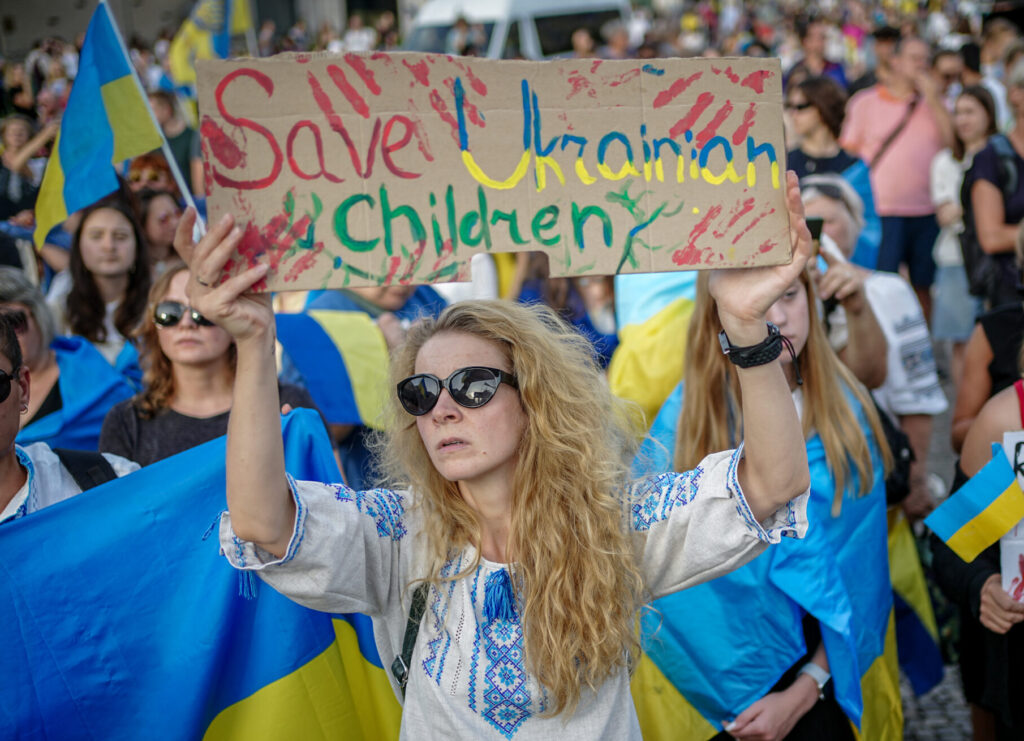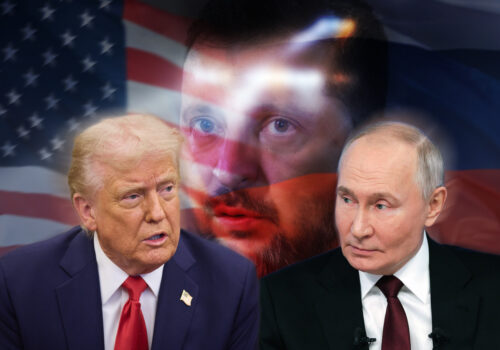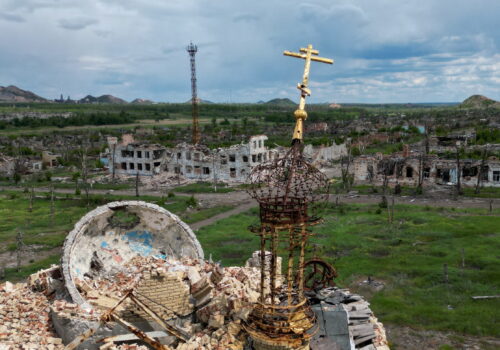As the leaders of the United States and Russia prepare to meet in Alaska on Friday to discuss ending the war in Ukraine, the White House has stated that Russia’s abduction of over 20,000 Ukrainian children “remains a concern” for President Trump. Unless the fate of these abducted children is addressed during the summit, it is difficult to imagine any meaningful progress toward a lasting peace.
Moscow’s mass abduction of Ukrainian children hit the headlines once again in early August amid reports that the Russian authorities had published an online catalog of Ukrainian children available for adoption. The database, which features photos, names, and descriptions of almost three hundred Ukrainian minors, was condemned as further evidence of the Kremlin’s state-sponsored campaign to kidnap young Ukrainians and send them to Russia.
“These children are presented like products in an e-commerce store, searchable by age, gender, eye and hair color, health status, and even personality traits,” commented Mykola Kuleba, the CEO of Save Ukraine, an organization engaged in efforts to rescue Ukrainian victims of Russia’s abduction campaign. “Russia isn’t even trying to hide it anymore. It’s openly trafficking Ukrainian children.”
Russia stands accused of kidnapping tens of thousands of Ukrainian children since the onset of the full-scale invasion in February 2022. Victims have typically been taken from orphanages in occupied regions of Ukraine or removed from the care of relatives. In some instances, Ukrainian children were enticed by the promise of free vacations at summer camps before disappearing.
Once they have been taken to Russia, many abducted Ukrainian children have recounted their experience of ideological indoctrination at “reeducation camps” as part of a process designed to rob them of their Ukrainian heritage and impose a Russian identity. Thousands are also reportedly being forced to join Russian paramilitary youth organizations with the aim of turning them into future soldiers for Putin’s war against Ukraine and the wider Western world.
Stay updated
As the world watches the Russian invasion of Ukraine unfold, UkraineAlert delivers the best Atlantic Council expert insight and analysis on Ukraine twice a week directly to your inbox.
The mass abduction of Ukrainian children is recognized internationally as one of the gravest Russian war crimes committed during the full-scale invasion of Ukraine. Some analysts believe it may qualify as genocide in line with the 1948 United Nations Genocide Convention, which identifies “forcibly transferring children of the group to another group” as one of five recognized acts of genocide.
In March 2023, the International Criminal Court in The Hague issued an arrest warrant for Russian President Vladimir Putin for his personal role in the mass abductions. While there is little chance of Putin being prosecuted for war crimes in The Hague, the arrest warrant has proved hugely embarrassing for Russia and has made it difficult for the Kremlin dictator to travel internationally, as ICC member countries are now technically obliged to arrest him. This has prevented Putin from attending annual BRICS summits in South Africa and Brazil in recent years.
Putin’s fears of possible arrest for his involvement in the mass kidnapping of Ukrainian children may have influenced the choice of Alaska as the location for this week’s summit. The United States has not signed up to the ICC and is therefore under no obligation to detain the Russian leader. Alaska borders Russia itself and can be reached without crossing the airspace of ICC member states, making it a particularly suitable venue from Putin’s perspective. It is crucial that the issue of child abductions now remains on the agenda when the two leaders sit down for talks on Friday.
Eurasia Center events

The international community has been outspoken in its condemnation of the Kremlin’s kidnapping campaign. In early August, representatives from a coalition of 38 countries issued a joint statement calling for the immediate return of abducted Ukrainian children while demanding that the Russian authorities “cease to alter the identity of children, including changes to their citizenship, placement in Russian families or institutions, ideological indoctrination, and exposure to militarization.”
In the United States, Senator Richard Durbin introduced a Senate resolution in spring 2025 condemning Russia’s illegal abduction of Ukrainian children. Meanwhile, Republican Senator Chuck Grassley and Democratic Senator Amy Klobuchar have recently cosponsored the Abducted Ukrainian Children Recovery and Accountability Act to potentially provide enhanced US support for Ukraine as it seeks to identify and rescue kidnapped children.
President Trump has indicated that he will work to support the return of Ukrainian children abducted by Russia, and has said he believes he can influence Putin on the issue. However, the Trump Administration has also cut funding to a key initiative tracking young Ukrainian victims of Russia’s deportations. Friday’s summit now presents Trump with the ideal opportunity to show that he remains committed to ending the abduction of Ukrainian children.
Rescuing Ukraine’s kidnapped kids would be a meaningful step toward a lasting settlement to end Europe’s largest war since World War II. It is also a relatively realistic objective at a time when there appears to be very little prospect of Putin or any other Russians facing justice for war crimes committed in Ukraine. By pressing Putin to return the thousands of Ukrainian children abducted since 2022, Trump can demonstrate that Russia will face a degree of accountability for the crimes of the invasion. Until Ukraine’s stolen children come home, Russia’s sense of impunity will only grow.
Mercedes Sapuppo is an assistant director at the Atlantic Council’s Eurasia Center.
Further reading
The views expressed in UkraineAlert are solely those of the authors and do not necessarily reflect the views of the Atlantic Council, its staff, or its supporters.

The Eurasia Center’s mission is to enhance transatlantic cooperation in promoting stability, democratic values, and prosperity in Eurasia, from Eastern Europe and Turkey in the West to the Caucasus, Russia, and Central Asia in the East.
Follow us on social media
and support our work
Image: Kay Nietfeld/dpa via Reuters Connect





